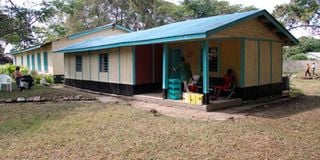Anti-GBV advocates revive calls for more shelters

A GBV recovery centre at Homa Bay County Teaching and Referral Hospital on November 23, 2021. Anti-GBV advocates have revived calls for creation of adequate shelters to provide emergency care to violated survivors.
What you need to know:
- In Kenya, some shelters shut down for lack of resources as donors ceased to support the services, yet more were needed at the time.
- A 2020 study established a GBV spike of 92.2 per cent in a country where GBV lifetime prevalence for women and men stands at 38 per cent and 20.9 per cent respectively.
Anti-gender-based violence (GBV) advocates have revived calls for creation of adequate shelters to provide emergency care to violated survivors.
As of November 29, there were 52 shelters spread across 18 counties, including Nairobi, Mombasa, Kwale, Kiambu, Kajiado, Kisumu, Machakos, Kilifi and Makueni. The other counties are Meru, Muranga, Nyeri, Nakuru, Laikipia, Samburu, Busia, Migori and Tharaka Nithi.
The world marks this year's 16 Days of Activism against GBV under the theme UNiTE! Activism to end violence against women and girls, spotlighting the need to honour efforts towards tackling the social pandemic in the backdrop of Covid-19, which massively backtracked global interventions on GBV.
In Kenya, for instance, some shelters shut down for lack of resources as donors ceased to support the services, yet more were needed at the time.
A 2020 study by National Crime Research Centre (NCRC) established a GBV spike of 92.2 per cent in a country where GBV lifetime prevalence for women and men stands at 38 per cent and 20.9 per cent respectively.
High demand for services
During a Tuesday webinar on Re-energising stakeholder collaboration to end violence against women and girls, Njeri Migwi, the executive director of Usikimye, said existing shelters cannot meet the demand for services. Usikimye is a community organisation that works towards ending GBV.
“We run three shelters and they are often full," she said during the webinar organised by Journalists for Human Rights(JHR).
She lobbied for creation of a law on the provision of shelters, outlining funding mechanism for the facilities. “Let's have the government funding shelters because running a shelter is quite an expensive undertaking," she said.
Meanwhile, JHR project manager Samuel Muraya said fighting GBV needed a collective responsibility. “It is up to all of us to end GBV by working with the government and taking a personal responsibility to sensitise our loved ones to GBV,” he said.
With information, he said, women and men can identify GBV danger signs early enough and walk away.
Uzalendo Africa Initiative executive director Anne Maua identified the emergence of child gangs as a threat to the anti-GBV drive.
“There are juvenile gangs in Mombasa perpetrating GBV and their girlfriends don’t know where to run to," she noted.





